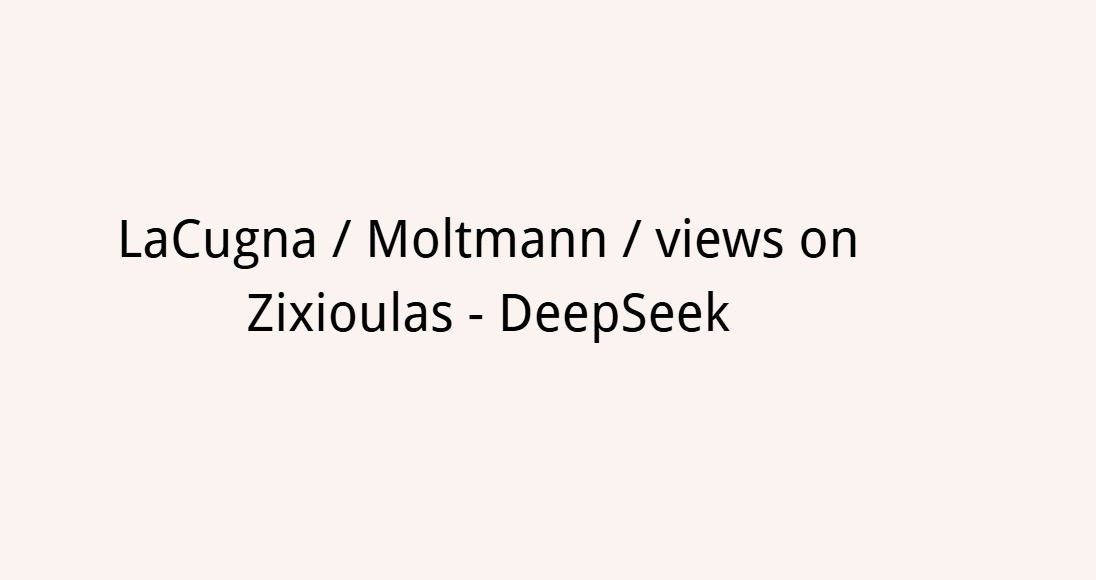Here’s a detailed elaboration on how **Catherine Mowry LaCugna** (Catholic) and **Jürgen Moltmann** (Protestant) developed relational theologies resonant with—but distinct from—Zizioulas’s *Being as Communion*:
—
### **Catherine Mowry LaCugna (1952–1997)**
**Key Work:** *God For Us: The Trinity and Christian Life* (1991)
#### **Core Thesis:**
LaCugna argues that the Trinity is not a metaphysical puzzle to be solved but **the revelation of God’s desire to be “God-for-us”**—a communion of love inviting humanity into relationship. The *economic* Trinity (God’s self-revelation in history) *is* the *immanent* Trinity (God’s eternal being).
#### **Key Similarities with Zizioulas:**
| **Theme** | **LaCugna** | **Zizioulas Parallel** |
|————————–|–
| **Priority of Communion** | God’s being *is* relational (“God is a communion of persons”). | “Being as Communion”: Ontology grounded in *koinonia*. |
| **Critique of Individualism** | Rejects Western hyper-focus on the *individual* divine essence (Augustine, Aquinas). | Condemns “substance metaphysics” as isolating. |
| **Ecclesial Implications** | The Church is called to mirror Trinitarian mutuality, equality, and self-gift. | Church as the icon of Trinitarian relationality. |
| **Practical Focus** | Trinity must transform *ethics*: Relationships should reflect perichoretic love. | Personhood realized *only* in ecclesial communion. |
#### **Distinctive Contributions:**
1. **Anti-Speculative Approach:**
– Dismisses abstract, post-Augustinian Trinitarian debates as irrelevant.
– Grounds theology in **praxis**: The Trinity matters because it models how humans should live.
2. **Feminist & Egalitarian Ethics:**
– Critiques hierarchical Trinitarian models (e.g., “Father as monarch”).
– Perichoresis (mutual indwelling) inspires **egalitarian relationships**, rejecting domination.
3. **Universal Scope:**
– God’s communion extends to *all creation*, not just the Church.
– Salvation = inclusion in divine life through Christ (*cf.* Zizioulas’s *theosis*).
#### **Critical Contrast to Zizioulas:**
– **No Ontological Grounding:** LaCugna avoids claiming communion *defines being itself*. For her, Trinity is a *model* for relational existence, not its ontological foundation.
– **Western Engagement:** Builds on Rahner, Barth, and feminist theology rather than patristics.
– **Sacramental Gap:** Less emphasis on Eucharist as *ontologically constitutive* of the Church.
—
### **Jürgen Moltmann (b. 1926)**
**Key Work:** *The Trinity and the Kingdom* (1980)
#### **Core Thesis:**
Moltmann’s “Social Trinity” portrays God as a **community of mutual self-giving love**, united in solidarity with suffering creation. The Cross reveals a “God who suffers with us,” liberating the oppressed.
#### **Key Similarities with Zizioulas:**
| **Theme** | **Moltmann** | **Zizioulas Parallel** |
|————————–|–
| **Social Trinity** | Three Persons in egalitarian, perichoretic fellowship. | Trinity as prototype of personhood-in-communion. |
| **Political Ecclesiology** | The Church must embody Trinitarian love by confronting injustice. | Church as the locus of true personhood. |
| **Liberation Focus** | God’s kingdom demands freedom for the marginalized. | Personhood requires liberation from “biological necessity”. |
| **Eschatological Hope** | Trinity’s future kingdom transforms creation. | Church as eschatological community. |
#### **Distinctive Contributions:**
1. **The Crucified God:**
– The Cross is a **Trinitarian event**: The Father abandons, the Son suffers, the Spirit sustains.
– God’s solidarity with suffering critiques “apathetic” theism.
2. **Revolutionary Perichoresis:**
– Mutual indwelling implies **anti-hierarchical politics**.
– The Church must be a “community without domination.”
3. **Cosmic Redemption:**
– Trinity’s love heals *all creation* (Rom 8:21), not just humans.
#### **Critical Contrast to Zizioulas:**
– **Emphasis on Suffering:** Moltmann’s Trinity is shaped by Holocaust trauma; Zizioulas focuses on resurrectional *victory*.
– **Ecclesiology:** Moltmann’s Church is a **liberation movement**; Zizioulas’s is a **sacramental organism**.
– **Metaphysical Caution:** Moltmann avoids grounding ontology in communion, fearing tritheism.
– **Western Liberative Lens:** Uses Trinity to critique capitalism, sexism, and ecological abuse.
—
### **Synthesis: Shared Vision, Different Paths**
| **Aspect** | **Zizioulas (Orthodox)** | **LaCugna (Catholic)** | **Moltmann (Protestant)** |
|——————|———-
| **Starting Point** | Eucharist/Church | Rahner’s Rule (“Economic = Immanent”) | Theology of the Cross |
| **Goal** | *Theosis* (deification) | Ethical transformation | Political liberation |
| **Key Mechanism**| Sacraments | Praxis of love | Kingdom justice |
| **Critique Focus**| Individualism/substance metaphysics | Speculative theology | Oppressive structures |
—
### **Why They Matter Alongside Zizioulas:**
These theologians **democratized the Trinity**, making it:
1. **Ethically actionable** (LaCugna),
2. **Politically revolutionary** (Moltmann),
3. **Ontologically foundational** (Zizioulas).
All three reject a distant, monarchical God, insisting that **God’s relational essence must reshape human community**—whether through the Church’s sacramental life (Zizioulas), egalitarian ethics (LaCugna), or liberative praxis (Moltmann). Together, they represent a 20th-century renaissance in relational theology across traditions.




